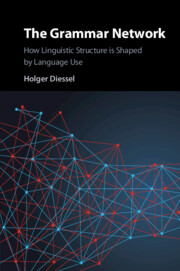Book contents
- The Grammar Network
- The Grammar Network
- Copyright page
- Contents
- Figures
- Tables
- Preface
- Abbreviations
- 1 Introduction
- Part I Foundations
- Part II Signs as Networks
- 4 The Taxonomic Network
- 5 Sequential Relations
- 6 Symbolic Relations
- Part III Filler–Slot Relations
- Part IV Constructional Relations
- References
- Author Index
- Subject Index
4 - The Taxonomic Network
from Part II - Signs as Networks
Published online by Cambridge University Press: 12 August 2019
- The Grammar Network
- The Grammar Network
- Copyright page
- Contents
- Figures
- Tables
- Preface
- Abbreviations
- 1 Introduction
- Part I Foundations
- Part II Signs as Networks
- 4 The Taxonomic Network
- 5 Sequential Relations
- 6 Symbolic Relations
- Part III Filler–Slot Relations
- Part IV Constructional Relations
- References
- Author Index
- Subject Index
Summary
All aspects of linguistic knowledge are ultimately based on speakers’ experience with lexical expressions, but of course, knowledge of language, notably, grammar, exceeds their memory of particular lexical tokens. It is a standard assumption of the usage-based approach that grammar involves a taxonomic network of constructions ranging from prefabricated strings of lexical expressions to highly abstract schemas. Chapter 4 describes the taxonomic organization of constructions and their development in L1 acquisition and language change. It includes a detailed discussion of current research on statistical grammar learning in infancy, the acquisition of constructions during the preschool years and two case studies on the rise of constructional schemas in language history.
Keywords
- Type
- Chapter
- Information
- The Grammar NetworkHow Linguistic Structure Is Shaped by Language Use, pp. 43 - 62Publisher: Cambridge University PressPrint publication year: 2019

